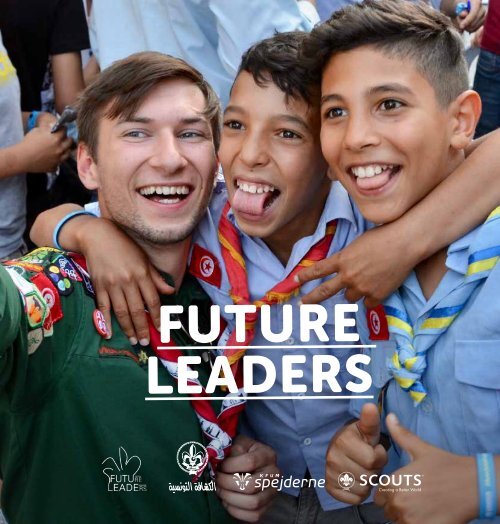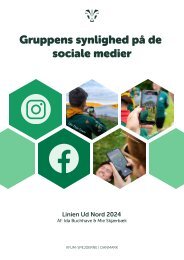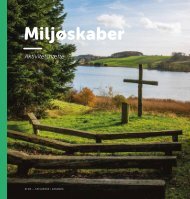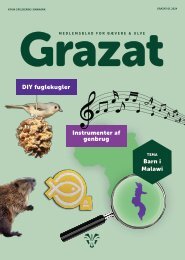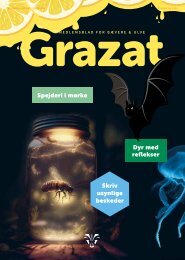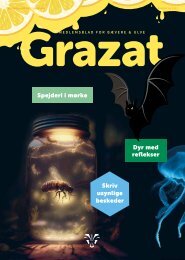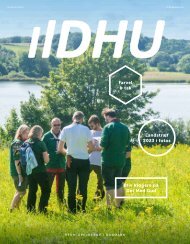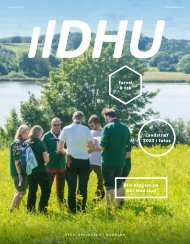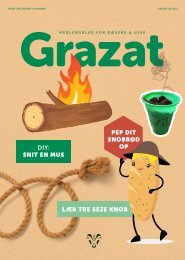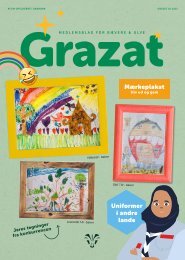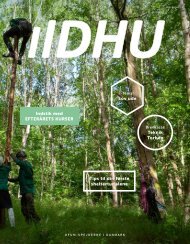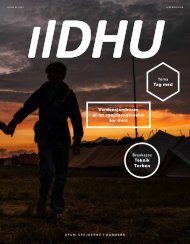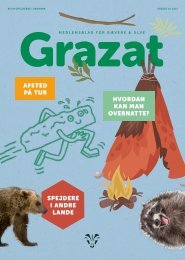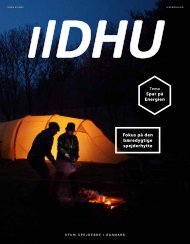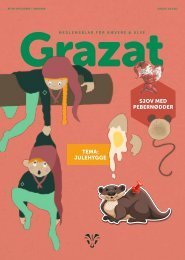Future Leaders
Welcome to the stories and living tales of those who have been part of the Future Leaders partnership throughout the years. For more than a decade, the Future Leaders partnership has brought together Danish and Tunisian scouts with the aim to inspire and change the world and society we live in.
Welcome to the stories and living tales of those who have been part of the Future Leaders partnership throughout the years. For more than a decade, the Future Leaders partnership has brought together Danish and Tunisian scouts with the aim to inspire and change the world and society we live in.
- No tags were found...
Create successful ePaper yourself
Turn your PDF publications into a flip-book with our unique Google optimized e-Paper software.
FUTURE<br />
LEADERS
FUTURE LEADERS<br />
DANISH-TUNISIAN PARTNERSHIP<br />
FUTURE LEADERS<br />
DANISH-TUNISIAN PARTNERSHIP<br />
FUTURE LEADERS<br />
<strong>Future</strong> <strong>Leaders</strong><br />
First published 2021<br />
Making an Impact and Leaving<br />
the World a Little Better<br />
Text<br />
Katrine Jacobsen,<br />
Julie Søndergård Jensen<br />
Editors<br />
Sara Maria Cordtz,<br />
Pia Redbourn,<br />
Katrine Jacobsen<br />
Graphic Design<br />
Anne-Marie Krogh Designstudio<br />
Photos<br />
Jakob Kristoffersen,<br />
Josefine Breschel Rasmussen,<br />
Julie Søndergård Jensen,<br />
Koussay Limem, Mahdi Ladhari,<br />
Sarra Mezni and other volunteers in<br />
the <strong>Future</strong> <strong>Leaders</strong> partnership<br />
Welcome to the stories and living tales<br />
of those who have been part of the <strong>Future</strong><br />
<strong>Leaders</strong> partnership throughout the<br />
years. For more than a decade, the <strong>Future</strong><br />
<strong>Leaders</strong> partnership has brought together<br />
Danish and Tunisian scouts with the aim<br />
to inspire and change the world and society<br />
we live in. The partnership has helped<br />
us in showing the world that there is more<br />
to scouting than camping and tying knots.<br />
We are global citizens and when brought<br />
together, we succeed in strengthening<br />
local communities, building cross-cultural<br />
friendships, and fostering innovation,<br />
leadership and dreams.<br />
The stories in this booklet have been<br />
gathered in early 2020 using semi-structured<br />
intercultural interviews. We met<br />
each other in dialogue and found the<br />
exchange mutually beneficial. We thank<br />
each and every one for opening up and<br />
sharing their story. We hope the reader of<br />
this booklet will be inspired by the impact<br />
the <strong>Future</strong> <strong>Leaders</strong> partnership has on individuals<br />
and on the surrounding society.<br />
To showcase how small impacts cause a<br />
ripple effect, we have incorporated the<br />
Sustainable Development Goals (SDGs)<br />
to help describe how a true change can<br />
come if amplifying projects like <strong>Future</strong><br />
<strong>Leaders</strong>. The SDGs are a global sustainability<br />
agenda set by the UN to help us stay<br />
on track to ensure our common planet. Incorporated<br />
in the SDGs, is the lesson that<br />
the goals can only be reached through international<br />
partnership. Partnerships like<br />
<strong>Future</strong> <strong>Leaders</strong> that can inspire people to<br />
leave the world a little better than they<br />
found it.<br />
Enjoy,<br />
// <strong>Future</strong> <strong>Leaders</strong><br />
Donors<br />
3
FUTURE LEADERS<br />
DANISH-TUNISIAN PARTNERSHIP<br />
FUTURE LEADERS<br />
DANISH-TUNISIAN PARTNERSHIP<br />
Content<br />
Making an Impact and Leaving the World a Little Better . .......3<br />
YOUNG IN<br />
TUNISIA<br />
YOUNG IN TUNISIA. ..................................................................5<br />
My Family Says I Have Become a Leader. .................................6<br />
Permission to Speak. .................................................................9<br />
It was Life-Changing. ...............................................................10<br />
Advocacy Is Life-Changing. .....................................................13<br />
Making a Change in Her Home Area. ......................................14<br />
NON-SCOUTS IN A SCOUT WORLD. ...................................... 17<br />
Use Your Words Wisely. ...........................................................18<br />
Word Cloud . ............................................................................19<br />
We are Related, Actually. ........................................................21<br />
The Judgmental Gap between Perception and Reality. ........22<br />
SOCIAL INITIATIVES. ............................................................. 25<br />
Join the Environment Club. ....................................................26<br />
Traditional Handcrafts with a Modern Touch. .......................28<br />
Bringing Reading to Life in Tunisia. ........................................30<br />
LIFE AND CAREER SKILLS. .................................................... 31<br />
Create Your Own Success. .......................................................32<br />
Let the Small Woman Talk. .....................................................35<br />
Life Skills to Improve Society. .................................................36<br />
That’s the Dream. ....................................................................39<br />
A Plus on Your Resume. ...........................................................40<br />
Since the Jasmine revolution, the youth of<br />
Tunisia have become increasingly aware<br />
of their role and responsibility in building<br />
a democratic society and using their<br />
freedom of speech. One of the recurring<br />
events of <strong>Future</strong> <strong>Leaders</strong> is the Young<br />
Voices Forum, which was created to encourage<br />
youth to take action and develop<br />
their skills in advocacy, dialogue and<br />
conflict management. Competencies that<br />
were deemed necessary to citizens of a democracy.<br />
At the end of each Young Voices<br />
Forum, a closing ceremony is organised<br />
with participation of influential people,<br />
who discuss societal issues and suggestions<br />
for improvement with the young<br />
people participating at the event. The participants<br />
vote and elect a President and a<br />
Vice President among themselves, who<br />
lead the session and the discussion. In the<br />
following section, you will meet Mohamed<br />
Dhia Bouchaala and Sarra Mezni, who were<br />
elected President and Vice President.<br />
Apart from strengthening national citizenship,<br />
a strong priority for the <strong>Future</strong> <strong>Leaders</strong><br />
partnership is ensuring cross-cultural<br />
exchange between youth, creating friendships<br />
and fostering respect and understanding<br />
across borders.<br />
Currently, <strong>Future</strong> <strong>Leaders</strong> is organised in<br />
three components, with the one named<br />
‘Democratic Change Agents’ (DCA) focusing<br />
solely on young people. The youth are<br />
the future and the partnership focuses on<br />
building their leadership skills, their creativity<br />
and their respect, so they can become<br />
true future leaders.<br />
In addition to Mohamed Dhia and Sarra,<br />
this section gives you the stories of Emna<br />
Nakib, Yasmine Driss, and Sahar Zwaghi.<br />
4<br />
5
FUTURE LEADERS<br />
DANISH-TUNISIAN PARTNERSHIP<br />
FUTURE LEADERS<br />
DANISH-TUNISIAN PARTNERSHIP<br />
It is often said that one takes responsibility<br />
when getting responsibility.<br />
This seems to be true for Mohamed, who<br />
evolved as leader, when he was elected<br />
the President of National Young Voices<br />
Forum in 2018.<br />
“Taking on the role as President was a<br />
huge learning experience for me, everyone<br />
should get to try it! It was a great success<br />
for me, and I took a lot away from it”,<br />
Mohamed tells us initially.<br />
Digging deeper, Mohamed focuses on two<br />
aspects of his own development during<br />
the Forum:<br />
Failing is Natural and Communication<br />
is Key<br />
“I have learned a lot from my mistakes,”<br />
Mohamed says.<br />
“I have become better at learning from<br />
mistakes and openly fixing the mistakes.<br />
One example was a mispronunciation of<br />
MOHAMED DHIA BOUCHAALA<br />
My Family Says I Have<br />
Become a Leader<br />
an event name causing misunderstandings,<br />
which I then had to fix, so everyone<br />
was on the same page. The mistake<br />
taught me the importance of the receiver<br />
being on the same page as myself when<br />
communicating, ensuring clear communication.”<br />
Clear communication is key, Mohamed<br />
has learned. Both from being the President<br />
of the Forum and from having to<br />
contact and communicate with people<br />
and decision-makers for the advocacy<br />
campaign. All these experiences have<br />
made Mohamed a better communicator.<br />
He is now better at giving clear statements<br />
and better at making sure everyone understands<br />
what he is saying.<br />
Now, Mohamed feels confident communicating<br />
with all kinds of people and comfortable<br />
speaking in front of a crowd. In<br />
addition, he is much better at English now<br />
– better than any of his Tunisian friends.<br />
Seeing the importance of clear communication<br />
and experiencing how language<br />
can open new doors has sparked a great<br />
interest in Mohamed. So great, that he<br />
now wants to pursue a different career<br />
where he can focus on and learn more<br />
about communication and psychology.<br />
Be Curious and Respect Differences<br />
During the Forum and the following advocacy<br />
campaign, Mohamed got better at<br />
seeing different perspectives and speaking<br />
with people with other perceptions<br />
than himself. His advice to others is to<br />
always be curious, especially when meeting<br />
other cultures:<br />
“Different cultures can always give you<br />
new inputs on your own life. But remember<br />
- you don’t know their culture, so you<br />
have to be curious and open to learn more<br />
about it. Don’t judge them too quickly.”<br />
With curiosity, Mohamed got to understand<br />
and learn from the differences and manage<br />
them smoothly. He developed respect and<br />
acceptance of other genders, ages, cultures,<br />
perspectives, and thoughts.<br />
To him, respect and acceptance are also<br />
important in leadership. Being open to<br />
all people is where you learn the most.<br />
And he has learned a lot about leadership<br />
since participating in the National Young<br />
Voices Forum.<br />
He is a new Mohamed. Less shy and more<br />
courageous - and more of a leader. Previously,<br />
he did not stand up and take on the<br />
role of a leader, and he didn’t have courage<br />
to plan something or make decisions. He<br />
does now.<br />
“It has been a lot of personal development<br />
– which is also easier to tell about to<br />
friends, if you want to talk about scouts.<br />
My friends and family have also told me<br />
that they see a change in me, that I have<br />
changed my attitude and become a leader.<br />
They say that now I take more responsibility<br />
and more action in all aspects of<br />
life.<br />
The project has made me better, and<br />
showed me how to be a leader in society.”<br />
The President at<br />
Young Voices is elected at the end<br />
of the forum before the final closing<br />
ceremony, in which the Young Voices<br />
President and Vice President gather people<br />
and hold speeches for the audience. When<br />
elected president, you have made an<br />
outstanding performance and development<br />
at the forum, and are recognised by the<br />
other participants who elect both the<br />
President and the Vice President.<br />
6<br />
7
FUTURE LEADERS<br />
DANISH-TUNISIAN PARTNERSHIP<br />
FUTURE LEADERS<br />
DANISH-TUNISIAN PARTNERSHIP<br />
EMNA NAKIB<br />
Permission to Speak<br />
Dressed in her scout uniform, Emna Nakib greets us in the backyard of Les<br />
Scouts Tunisiens’ Head Quarters. Ever since she was old enough to join,<br />
she has been a scout. It is clear that for her scouting is a lifestyle and not<br />
just a hobby. At the age of 16, Emna participated in a National Young Voices<br />
Forum, where she not only made life-long friendships, she also found<br />
her voice to speak up through skills of advocacy, debate techniques and<br />
participating in dialogues.<br />
”Gender equality is not only<br />
about having equal rights<br />
between males and females,<br />
but also acknowledging the<br />
advantages of the different<br />
genders and acknowledging<br />
how we can work in equality<br />
no matter the gender”<br />
Emna Nakib<br />
The freedom to speak<br />
In a democracy, there is freedom of speech<br />
– but who will listen? Gender equality is not<br />
only about having equal rights between<br />
males and females, but also acknowledging<br />
the advantages of the different genders<br />
and acknowledging how we can work in<br />
equality no matter the gender. Together<br />
with other girls, Emna has created a community<br />
where they encourage each other<br />
to strive for something bigger and better<br />
and they discuss the question: “What can<br />
we as girls give to society?”. For Emna,<br />
speaking your truth is not always straightforward<br />
as a young person and as a woman.<br />
The girls are therefore doing advocacy<br />
campaigns to make people listen, to educate<br />
and get acknowledged, because they<br />
know they have something important to<br />
say.<br />
Emna is always working hard to deliver and<br />
seeks many different solutions to get the<br />
best outcome, however, it has proved difficult<br />
in her scout uniform; Tunisian scouts<br />
always need written permission from an<br />
older - often male - leader every time they<br />
participate in an activity or event, which<br />
complicated and held back Emna’s work.<br />
However, after many triumphs, she has<br />
now worked her way through the bureaucracy<br />
and no longer requires any permissions,<br />
because many responsible people<br />
know and recognize her work. This gives<br />
her power and freedom to speak openly<br />
and independently.<br />
Best female leader<br />
One year after she participated in the Forum,<br />
Emna was awarded “Best Female<br />
Leader” in her scout group. This was an<br />
incredible compliment and accomplishment<br />
for her as an individual and for<br />
women in general working their way into<br />
society in Tunisia. Now, she only wants to<br />
do more and to reach further. She is motivated<br />
to keep using her powerful voice<br />
and set a mark in society as a strong female<br />
figure. She will keep fighting. Encouraged<br />
by the other participants from<br />
the Young Voices Forum she is eagerly advocating<br />
her values and beliefs.<br />
8<br />
9
FUTURE LEADERS<br />
DANISH-TUNISIAN PARTNERSHIP<br />
FUTURE LEADERS<br />
DANISH-TUNISIAN PARTNERSHIP<br />
YASMINE DRISS<br />
It was Life-Changing<br />
17-year-old Yasmine participated in a National Young Voices Forum<br />
and the following advocacy campaigns as one of few non-scouts.<br />
She says it changed her life.<br />
“Now, even when I am<br />
not the decision-maker,<br />
I speak up and try to<br />
influence others”<br />
Yasmine Driss<br />
“The project helps to spread love and<br />
peace. It teaches about communication between<br />
different cultures and civilizations.<br />
I want to thank the project. It lit up my life<br />
and now it helps me light up other people’s<br />
lives as well”.<br />
Big words offered on the <strong>Future</strong> <strong>Leaders</strong><br />
project by 17-year-old Yasmine. We meet<br />
her one and a half years after she participated<br />
in the National Young Voices Forum and<br />
organised an advocacy campaign. And she<br />
has nothing but praise for the project:<br />
“The experience taught me how to take my<br />
fear away, how to accept new challenges<br />
and to just go ahead.”<br />
You Don’t Have to Be the Leader to Share<br />
Your Opinion<br />
As one in a handful of non-scouts, Yasmine<br />
participated through the NGO 12h, where<br />
she is a journalist. And though scouting is<br />
different from her own volunteering, she especially<br />
took learnings on communication<br />
and teamwork with her to her own NGO, as<br />
well as to her own life.<br />
“Before, I always thought a team must consist<br />
of a leader and some team members. I<br />
was used to someone always giving tasks<br />
to the others, ordering who did what and<br />
deciding on behalf of the entire group. I was<br />
either the leader or a follower. In the Young<br />
Voices there was no leader in our team. We<br />
decided together and worked together”.<br />
The experience of being a self-organising<br />
team with no leader gave Yasmine a new<br />
perspective on teamwork. It showed her<br />
the importance of respect, time management<br />
and good communication. And it<br />
showed her that you do not have to be appointed<br />
the leader to share your thoughts<br />
and opinions.<br />
“Now, even when I am not the decision-maker,<br />
I speak up and try to influence<br />
others”, she tells us.<br />
With power and passion behind every<br />
word, she describes how using her voice,<br />
speaking up and influencing decisions help<br />
her take charge of her own life. She is no<br />
longer just standing by, passively letting life<br />
pass by on other people’s terms. And this<br />
has made a great difference in her life.<br />
“It has helped me to communicate, to influence<br />
and to lead. I definitely use this in my<br />
everyday life. It is life-changing, my whole<br />
life has changed! Both when I participate in<br />
civil society activities, at my job as a journalist,<br />
and at school, with my friends - all of<br />
it.”<br />
Cross-Cultural Understanding<br />
And this is not the only thing Yasmine took<br />
with her from the experience. The cultural<br />
meeting with both scouting culture and<br />
Danish culture extended her horizon tremendously.<br />
At first, she was worried about being a nonscout<br />
at a scouting event. That it would be<br />
hard to exchange ideas with scouts. She<br />
found it to be the exact opposite, having<br />
many fruitful interactions with scouts from<br />
both Tunisia and Denmark.<br />
She describes how Tunisians and Danes exchanged<br />
ideas and thoughts on big topics<br />
like MENA and Europe, Islam and Christianity,<br />
and developing and developed econ-<br />
omies. - And how she was proud to be an<br />
ambassador for her country and her local<br />
area, Sfax, when sharing thoughts and experiences<br />
from her own life in Tunisia.<br />
The interactions broadened Yasmine’s<br />
perspective on her own life, country and<br />
culture. Additionally, they proved to her<br />
that even though we are different, we also<br />
share a lot. That we can - and should -<br />
learn from each other.<br />
<strong>Future</strong> <strong>Leaders</strong> taught her to communicate<br />
better across cultures, and that you<br />
can work well together despite differences<br />
- especially if you are working to<br />
achieve a shared goal.<br />
For the partnership, this shared goal is<br />
clear: Building <strong>Future</strong> <strong>Leaders</strong> - future<br />
leaders like Yasmine who will use their<br />
voice and influence to help making the<br />
world a better place.<br />
10<br />
11
FUTURE LEADERS<br />
DANISH-TUNISIAN PARTNERSHIP<br />
FUTURE LEADERS<br />
DANISH-TUNISIAN PARTNERSHIP<br />
Advocacy Is Life-Changing<br />
At the Young Voices Forum, the participants learn about<br />
advocacy campaigns. For some, it is a whole<br />
new word and a totally new thing.<br />
“We cannot stop<br />
using technology,<br />
but we can use it<br />
more wisely”<br />
Yasmine Driss<br />
As we interview Tunisians Yasmine, Mohamed<br />
and Sahar, we talk about their<br />
experiences on making advocacy campaigns<br />
after participating in Young Voices<br />
Forum, as it is a whole new thing for<br />
all of them. They all agree that advocacy<br />
campaigns are a way to help other people<br />
and enlighten them about specific topics<br />
which have an impact on their everyday<br />
life. The campaigns they have carried out<br />
themselves after the forum involved several<br />
things such as talking to people to<br />
give information, doing workshops to enlighten<br />
them even more, talking to decision-makers<br />
and even being interviewed<br />
on the radio to open as many eyes as possible<br />
for the subject they were advocating<br />
for.<br />
Advocacy campaigns can be about all<br />
sorts of topics which can influence and<br />
change people’s everyday life and behavior.<br />
Yasmine and Mohamed did campaigns<br />
on using social media, and Sahar<br />
advocated for the negative side effects of<br />
technology and internet usage. All three<br />
chose topics in the realm of media and<br />
technology usage, as these things have<br />
become more and more part of everyday<br />
life without people knowing how to use it<br />
well or know much about possible negative<br />
side effects. For all three Tunisians,<br />
these are important topics to advocate<br />
for, so that the negative effects of technology<br />
usage can be brought to as many<br />
people’s attention as possible. “I believe<br />
our project has been life-changing, as we<br />
really got people aware of the problems”,<br />
Yasmine tells us. As a medical student, Sahar<br />
is especially concerned about negative<br />
side effects of technology such as<br />
eye problems, stress and loss of focus - all<br />
things doctors are dealing with today.<br />
Though it is a serious topic, the participants<br />
at the Young Voices Forum have<br />
really learned how to be creative in advocating.<br />
They have used their new skills<br />
to catch the attention of many different<br />
people, especially children and young<br />
people. When asked about the most important<br />
lesson from this campaign for<br />
children and young people, Yasmine answers:<br />
“We are in control of the media,<br />
not the other way around. We cannot stop<br />
using technology, but we can use it more<br />
wisely”. Sahar, Yasmine and Mohamed<br />
all agree that this is the main outcome<br />
of this advocacy campaign. And all three<br />
are passionate to continue advocating<br />
for what they believe in to make a better<br />
world. Going from not knowing how to<br />
do an advocacy campaign to eagerly doing<br />
more in the future has a tremendous<br />
impact on the development of society for<br />
the three young Tunisians and for all the<br />
people they are going to impact with their<br />
future advocacy campaigns.<br />
12<br />
13
FUTURE LEADERS<br />
DANISH-TUNISIAN PARTNERSHIP<br />
FUTURE LEADERS<br />
DANISH-TUNISIAN PARTNERSHIP<br />
SARRA MEZNI<br />
Making a Change in Her<br />
Home Area<br />
In the backyard of the scout head quarters,<br />
we met 18-year-old Sarra Mezni from<br />
Manouba, a town just outside Tunis, the<br />
capital of Tunisia. We talked to her just<br />
one week after her return from the Scout<br />
Scoop event in Denmark, her first time<br />
travelling internationally with the scouts.<br />
In 2018 she participated in the National<br />
Young Voices Forum, where she was<br />
awarded the title of ‘Vice President’, which<br />
has shown the path for Sarra as a strong<br />
female eager to do good in the world.<br />
International Going Local<br />
The Young Voices Forum is an international<br />
event for both Tunisians and Danes<br />
interacting and making changes using dialogue<br />
and debate techniques. As a scout,<br />
Sarra has not had an opportunity like this<br />
before, so she is very grateful for the possibility<br />
of an international event to broaden<br />
her perspective and she has been able<br />
to put her acquired skills to use in her local<br />
community of Manouba.<br />
After the forum, she was very keen on using<br />
her new status as Vice President as a<br />
way to start practicing the skills she has<br />
learned. She contacted the mayor and<br />
organized for all scout groups in the area<br />
to take action on the advocacy campaign<br />
she had started and organized a big event.<br />
For the event, they planned many fun activities<br />
while spreading the word about<br />
the negative uses of technology, which<br />
was the focus in Sarra’s advocacy campaign.<br />
The leaders also presented in front<br />
of the participants about how to gain new<br />
and healthier habits with devices. These<br />
activities and events, Sarra explained,<br />
made it possible for the local area to do<br />
more advocating and thereby engage in<br />
each other’s lives. Sarra described how<br />
“it is easier to communicate with society”<br />
by combining work with scouts and nonscouts<br />
in her area; she believes the mix<br />
gives power and motivation for more advocating<br />
and more activities, which provides<br />
great satisfaction. The collaborations will<br />
continue in the future with ease, as they<br />
have formed a solid starting point.<br />
From Problem to Solution<br />
By combining all the different skills of<br />
debating, convincing and negotiation in<br />
dialogue, Sarra also managed to find a<br />
path for when she faces a problem - she<br />
finds solutions both at home, in school<br />
and in society. For example, in her school<br />
they had a problem with thieves, so Sarra<br />
went to the administration and they took<br />
action and upscaled the security at the<br />
school. Sarra was very proud, as she used<br />
her negotiation skills from the Young Voices<br />
Forum. With these steps in the right direction,<br />
Sarra is eager to do more to make<br />
a change in her own community and in<br />
the world.<br />
Sarra participated in<br />
National Young Voices<br />
Forum in 2018 and was<br />
elected Vice President<br />
at the Forum. Two years<br />
later she traveled to<br />
Denmark to participate<br />
in Scout Scoop.<br />
14<br />
15
FUTURE LEADERS<br />
DANISH-TUNISIAN PARTNERSHIP<br />
FUTURE LEADERS<br />
DANISH-TUNISIAN PARTNERSHIP<br />
NON-SCOUTS<br />
IN A SCOUT<br />
WORLD<br />
It is important for the <strong>Future</strong> <strong>Leaders</strong> partnership to invite<br />
non-scouts to be a part of the events and training offered.<br />
Participation of non-scouts encourages a second look in<br />
the mirror, as more and different visions and perceptions<br />
are shared, thus opening participants’ eyes to other perspectives<br />
on the world. By mixing scouts and non-scouts,<br />
participants meet people different from themselves,<br />
which often teach everyone more about the world we all<br />
live together in.<br />
In this section, you will meet Nawras Halloul and Soulayma<br />
Dhiab, who both participated in an Awareness Seminar.<br />
An Awareness seminar has the purpose of addressing<br />
societal challenges, discussing possible solutions, and to<br />
gather people, who can collaborate and inspire each other<br />
to make local initiatives. The seminar lasts two to three<br />
days to ensure the challenges are thoroughly understood,<br />
as they cannot otherwise be addressed with any solution.<br />
The seminar is part of the component called ‘Social Entrepreneurship’.<br />
16<br />
17
FUTURE LEADERS<br />
DANISH-TUNISIAN PARTNERSHIP<br />
FUTURE LEADERS<br />
DANISH-TUNISIAN PARTNERSHIP<br />
SOULAYMA DHIAB<br />
Use Your Words Wisely<br />
WORDS CHOSEN BY THE INTERVIEWEES TO DESCRIBE<br />
THE FUTURE LEADERS PARTNERSHIP:<br />
Soulayma Dhiab is a non-scout who participated in an<br />
Awareness Seminar hosted by the <strong>Future</strong> <strong>Leaders</strong> partnership<br />
comfortable<br />
Youth<br />
Improve skills<br />
In Sousse, the third largest city in Tunisia,<br />
located at the coastline with the Mediterranean<br />
Sea at view, we meet Soulayma,<br />
a 21-year-old non-scout management<br />
student. She participated in an Awareness<br />
seminar through the <strong>Future</strong> <strong>Leaders</strong><br />
partnership and had the opportunity<br />
to go through her volunteer work at the<br />
non-governmental organization: Youth<br />
for Change Club. Being a non-scout at a<br />
scout event meant for her to mingle with<br />
new perspectives and it has widened her<br />
view upon how she as a volunteer can<br />
make a positive impact and change in<br />
the society in which she is living. This she<br />
found out by meeting scouts as a nonscout,<br />
because after all, we are all just humans<br />
– scouts and non-scouts.<br />
When asked about which impact the seminar<br />
has had in her everyday life, Soulayma<br />
immediately said: “To criticize words”.<br />
By talking with the other participants<br />
from all over Tunisia she has acknowledged<br />
that different words and the weight<br />
of the words have an effect on the people<br />
you are talking to. The use of words and<br />
how the words are acting in different situations.<br />
Soulayma knows an Arabic word<br />
for people who come from and live in rural<br />
places and poor areas. She told us, she<br />
personally did not think of this word in any<br />
bad way, but at the seminar she received<br />
several comments on it relating to racism<br />
and ethnicity which made her stop and<br />
think about it. She acknowledged it as an<br />
offensive word which should be avoided,<br />
and she now stopped using it because it<br />
can hurt other people’s feelings. This is an<br />
example on how our words weight in the<br />
minds of others and we are responsible for<br />
using words that are comfortable for the<br />
people among us and not for our own sake.<br />
In this way she was given a new perspective<br />
in how to see words having an effect<br />
on people. If a single word can hurt another<br />
human, we should choose another. There<br />
are plenty of different words out there to<br />
be used positively. In this way it is not only<br />
with our actions we can change the world<br />
for the better, also with our wording and<br />
the way we speak with others can make a<br />
difference.<br />
In addition to this, people in Tunisia, she<br />
says, do not read literature and fiction<br />
novels and have no interest hereby. This<br />
is why there is an absence of books and<br />
where to find them. She wants to make<br />
the access to books easier and more<br />
welcoming, especially for children. She<br />
has therefore started the project: Bookies.<br />
Bookies serves to collect used reading<br />
books and literature for children to<br />
read. They collect books from all over<br />
Tunisia and place them in schools in especially<br />
rural and poor places where the<br />
access to books is minimized due to other<br />
issues. Hereby Bookies is bringing the<br />
books into the life of the Tunisians with<br />
joy and pleasure, as it is not books for<br />
school-teaching but for reading literature<br />
and fictions. Which is what the Tunisians<br />
as a society have not before been interested<br />
in according to Soulayma.<br />
Efficiency<br />
motivation self-confidence<br />
hope<br />
good<br />
creative<br />
great<br />
change<br />
innovative<br />
scope/totality<br />
excellent Tolerance<br />
Communication<br />
Collaboration<br />
Revolutionary<br />
Development opportunity Curiosity<br />
new experience<br />
Success<br />
future<br />
18<br />
19
FUTURE LEADERS<br />
DANISH-TUNISIAN PARTNERSHIP<br />
FUTURE LEADERS<br />
NAWRAS HALLOUL<br />
Nawras Halloul is a nonscout<br />
who participated<br />
in an Awareness Seminar<br />
hosted by the <strong>Future</strong><br />
<strong>Leaders</strong> partnership, here<br />
she realised how different<br />
organizations can learn a<br />
lot from each other.<br />
We Are Related,<br />
Actually<br />
After the Awareness<br />
Seminar, I didn’t think<br />
“I can possibly do this”<br />
anymore. Instead I<br />
thought: “I am definitely<br />
going to do this, because<br />
this is amazing”<br />
Nawras Halloul<br />
In the coastal city Sousse in Tunisia,<br />
we are met by the biggest smile of Tunisia<br />
which belongs to Nawras. Just a<br />
few months after her participation in an<br />
Awareness Seminar, we meet Nawras for a<br />
talk. Nawras is young and has great plans<br />
for her future, in which she really wants to<br />
be involved in society. She is a management<br />
student and a volunteer in the Red<br />
Crescent organization, which together<br />
with the Red Cross is the biggest humanitarian<br />
organization in the world.<br />
At the Awareness Seminar, Nawras eagerly<br />
mingled with the other participants<br />
and quickly found that she shared common<br />
interests with many of them. This<br />
shows, that you do not have to be in the<br />
same organization to have things in common:<br />
“We are related”, Nawras says with<br />
a little laugh. She sees many advantages<br />
in meeting other volunteers from different<br />
organizations, because “the same<br />
problems that scouts are dealing with,<br />
we are dealing with, so we can help each<br />
other in many situations” - something she<br />
also realized when speaking about problem-solving.<br />
Nawras has found that problems in her<br />
own organization are also problems in the<br />
scouts and in other organizations as well.<br />
She has learned that having the same<br />
problems equals most likely also finding<br />
the same solutions. When Nawras and<br />
other volunteers started talking about<br />
how to find solutions to their problems,<br />
which were mostly internal problems in<br />
organizing the organizations, they found<br />
that by collaborating, they were really<br />
helping each other. By listening to others<br />
and widen your perspective, you gain<br />
new knowledge and a new point of view<br />
on how to solve problems. At the seminar,<br />
Nawras had an experience of chatting<br />
with both Tunisians and Danes and got<br />
“amazing new ideas with people that I<br />
don’t know. So I then thought, what if I did<br />
the same thing with people I know in my<br />
local community?” - and so she did. New<br />
ideas for activities in the local community<br />
were brought forward and the motivation<br />
grew to carry them out. Now, Nawras and<br />
other local volunteers are in the process<br />
of finding out which ideas to focus on and<br />
how to bring them to life. When you open<br />
your eyes for opportunities, you are exposed<br />
to new ways of seeing things that<br />
you can bring home to your local community.<br />
The learning is circular.<br />
Nawras knows that if you as a young person<br />
want to make a change, you are in<br />
fact able to do so. As a real go-getter, she<br />
exclaims: “After the Awareness Seminar, I<br />
didn’t think “I can possibly do this” anymore.<br />
Instead I thought: “I am definitely<br />
going to do this, because this is amazing”.<br />
For Nawras, the meeting with people she<br />
didn’t know before turned out to be the<br />
start of a bigger motivation for collaborating<br />
with people who she actually does<br />
know. With this in mind, Nawras is even<br />
more prepared for a future as a leader – a<br />
future leader.<br />
20<br />
21
FUTURE LEADERS<br />
DANISH-TUNISIAN PARTNERSHIP<br />
FUTURE LEADERS<br />
DANISH-TUNISIAN PARTNERSHIP<br />
The Judgmental Gap<br />
between Perception and Reality<br />
When speaking of<br />
prejudices, there is<br />
often a big gap between<br />
perception and reality. As<br />
both Yasmine and Nawras<br />
found out, there is a lot<br />
more to scouts than the<br />
stereotypes suggest.<br />
Globally there are more than 40 million scouts, however,<br />
the public perception of scouting is very varied, creating<br />
many different stereotypes. In conversation with non-scouts<br />
Yasmine and Nawras as well as scout Mohamed, we talked<br />
about the many types of different prejudices that they had<br />
before attending a scout event. Scout Mohamed explained<br />
how scouts can deal with these prejudices.<br />
Scouts Are Always Camping<br />
“They are always camping”, Nawras told<br />
us, when she had to describe what she<br />
thought scouts do. The stereotypical image<br />
is of a person with a backpack going<br />
into the wilderness and setting up a tent.<br />
This is a common prejudice, as part of it<br />
holds a truth, scouts do camp a lot, but it<br />
is not the only thing they do - as Nawras<br />
also found out herself, when she experienced<br />
a seminar hosted by the scouts.<br />
When she was first asked to join an event<br />
about civic society work hosted by the<br />
scouts Yasmine initially didn’t want to<br />
attend, because “if all scouts do is camping<br />
in the wild, what could they possibly<br />
teach me about citizenship?” Although<br />
skeptical, Yasmine did actually end up<br />
joining the event and found out that there<br />
is so much more to scouting than just<br />
camping.<br />
Scouts Are Only Singing by the Bonfire<br />
“Scouts are always singing,” Yasmine<br />
states, stereotyping the image of scouts<br />
as a group of people sitting around a bonfire<br />
and singing. Singing is a great activity<br />
to connect people and have fun, which<br />
scouts love to do, however, it is also not<br />
the only thing that they do. Scouting is<br />
part of something much bigger. Before<br />
joining the scout event, Yasmine was worried<br />
that it would be difficult to take part<br />
because it would be hard to exchange ideas<br />
with scouts. She had only thought of<br />
scouts stereotypically and not about their<br />
views of the world. When attending the<br />
event, Yasmine experienced having fruitful<br />
interactions with scouts. Yasmine’s experience<br />
shows how your perceptions are<br />
often proven wrong by reality. In reality,<br />
scouts do much more than just sing.<br />
Scouting Is Only for Children<br />
“Scouting is only for children who play<br />
and sing”, Yasmine thought when asked to<br />
join a scout event. When participating in a<br />
youth event she saw how scouts are of all<br />
ages and hereby also a lifestyle for many.<br />
You can start scouting at a young age,<br />
where you are invited into a group making<br />
you a part of a community. Playing and<br />
singing is part of this community, but as<br />
Yasmine and Nawras realized it does not<br />
stop when you grow up. For Mohamed,<br />
scouting is a lifestyle. As Mohamed puts<br />
it: “Scouts are so much more than playing<br />
and singing, they are all about good<br />
citizenship”. Maybe people will always<br />
have prejudices about scouts – and other<br />
groups or people in the society, but with<br />
an open dialogue we can move people’s<br />
opinion.<br />
22<br />
23
FUTURE LEADERS<br />
DANISH-TUNISIAN PARTNERSHIP<br />
FUTURE LEADERS<br />
DANISH-TUNISIAN PARTNERSHIP<br />
SOCIAL<br />
INITIATIVES<br />
Throughout the world, scouting focuses on the importance of<br />
active citizenship. This includes helping others and giving back<br />
to the community we are a part of. One of the ways active citizenship<br />
is promoted in <strong>Future</strong> <strong>Leaders</strong>, is through the activities<br />
in the ‘Social Entrepreneurship’ (SE) component. SE hosts Project<br />
Management Training teaching participants how to come up<br />
with, plan and execute a project, including keeping a budget. After<br />
the training, participants can seek and get funds from <strong>Future</strong><br />
<strong>Leaders</strong> for socially beneficial projects that help build capacity in<br />
the local community, so-called Social Initiatives.<br />
Social Initiatives are supported both in Tunisia and in Denmark.<br />
The purpose of the initiatives is to positively influence the everyday<br />
life of as many people as possible and to increase participation<br />
and engagement in society.<br />
Initiatives have run all over Tunisia and especially in the rural areas,<br />
it has made noticeable changes. In this section of the booklet,<br />
you will meet Habib and Mohamed Seddiki, who are both<br />
from the desert areas of Tunisia.<br />
24<br />
25
FUTURE LEADERS<br />
DANISH-TUNISIAN PARTNERSHIP<br />
FUTURE LEADERS<br />
HABIB MKADMI<br />
Join the Environment Club<br />
A social initiative started by Habib Mkadmi and Anis Amaidia<br />
funded by the <strong>Future</strong> <strong>Leaders</strong> partnership.<br />
We enter a school ground in the rural area<br />
outside the town of Gafsa in Southern Tunisia.<br />
This area is desert with barren land<br />
and lots of sand. The sand is not as lush as<br />
the soil in the northern part of the country,<br />
so not much is growing here. Anis Amaidia<br />
wanted to change that. After his participation<br />
in a Project Management Training,<br />
he made a plan and found a location for<br />
an ecological garden. At the center of this<br />
garden where the paths meet, we sit for a<br />
chat with Habib Mkadmi about the garden<br />
and how it all started. Like Anis, Habib is a<br />
leader in the local scout group, and they<br />
are both passionate about the growth of<br />
the garden.<br />
In order to get the garden up and running,<br />
Anis and Habib first needed the<br />
right location for it. They found a school<br />
which was rebuilt and modernized after<br />
the revolution to meet the needs of the<br />
future society. In combination with the<br />
modernization, the garden fits right into<br />
the grounds and activities of the school.<br />
Therefore, the garden is now a collaboration<br />
between the scouts and the school.<br />
Anis and Habib started by exchanging all<br />
the sand in the garden field for new fresh<br />
soil for the plants to grow in, and they also<br />
laid out an overview of the different parts<br />
of the garden. Then they planted different<br />
trees, plants and herbs in the new soil.<br />
They have ever since maintained the garden,<br />
so the plants do not die.<br />
Growing Educational Opportunities<br />
In partnership with the school, Anis and<br />
Habib host an “Environment Club’’ with<br />
over 215 members of children aged 13-15<br />
years from the local schools and scouts.<br />
The Environment Club meets every Saturday<br />
to maintain the garden and keep<br />
it neat for all seasons of the year. At the<br />
same time, the children are learning<br />
about the plants and herbs here, and how<br />
they have to be nurtured in order to grow,<br />
which will have a positive impact on the<br />
environment and climate. The school<br />
teachers also use the garden for exams<br />
and testing the children on the herbs<br />
growing here and what they are good for.<br />
The garden is a place for learning, and by<br />
teaching the young children about how<br />
the earth needs nurturing, they become<br />
more aware of it and able to act upon it<br />
in the future.<br />
Focus on the Climate<br />
The climate and environment are in focus<br />
in every aspect of the garden. In this<br />
area of Tunisia, phosphor and gasses are<br />
extracted from the ground as important<br />
resources for the Tunisian economy, because<br />
it can be exported to other countries.<br />
But it is very bad for the people living<br />
in the area because it causes a lot of<br />
pollution. The garden helps with the biodiversity<br />
of the area and counteracts the<br />
huge emission of gasses and problems<br />
with pollution.<br />
The Growth of the Greens<br />
When the garden was built, it was a perfect<br />
opportunity for the locals to learn about<br />
how plants grow and evolve in a healthy<br />
environment. By founding the garden, Anis<br />
Amaidia started participating in the actions<br />
of the municipality, and he also took<br />
this project further by advocating for more<br />
trees to be planted in the neighbourhood.<br />
This inspired families in the area to plant<br />
a tree in their front yard. Now, when you<br />
drive down the roads of the neighbourhood,<br />
you see trees here and there planted<br />
by children and their parents to help<br />
the bio diversity of this desert area. The<br />
desert will become greener and greener.<br />
“The garden is a place for<br />
learning, and by teaching<br />
the young children about<br />
how the earth needs<br />
nurturing, they become<br />
more aware of it and<br />
able to act upon it in the<br />
future”<br />
Habib Mkadmi<br />
26<br />
27
FUTURE LEADERS<br />
DANISH-TUNISIAN PARTNERSHIP<br />
FUTURE LEADERS<br />
DANISH-TUNISIAN PARTNERSHIP<br />
MOHAMED SEDDIKI<br />
Traditional Handcrafts with<br />
a Modern Touch<br />
In 2019, Mohamed Seddiki started a Social<br />
Initiative focused on creating innovative<br />
products using traditional handcraft methods.<br />
In rural Tunisia in the town Al-Rudayyif,<br />
women have success with selling creative<br />
handcraft of all types. It is a tradition, but<br />
the tradition has met declining demands<br />
for years. Not for these women, though,<br />
as they succeed by adding modern touches<br />
and new elements to the traditional<br />
handcrafts of Tunisia. Something that is<br />
popular among Tunisians and tourists<br />
alike, helping the women to earn money<br />
to help supply their families in an area<br />
where most jobs are in mining.<br />
The success is an outcome of a Social Initiative<br />
started by Mohamed Seddiki and<br />
funded by the <strong>Future</strong> <strong>Leaders</strong> project in<br />
2019. With the funding he set up a fourteen<br />
days’ training with a specialist, who<br />
taught the participants to be more creative<br />
with crafts.<br />
They went through ideas and techniques<br />
on how to differentiate their work and<br />
add a modern touch to traditional handcraft,<br />
as well as inspiration to make sustainable<br />
products like soap from oil leftovers.<br />
During the training, the women tried<br />
out ideas and produced things to be sold<br />
at the scout group, and when they left the<br />
training, they took the ideas and methods<br />
with them to produce on their own.<br />
According to Mohamed Seddiki, the initiative<br />
has achieved two great things:<br />
Helped Revolutionize Tunisian<br />
Handcraft<br />
The initiative gives space and time for the<br />
women to try out new ideas for the products.<br />
They have started thinking outside<br />
the box and are showing lots of creativity<br />
and innovation.<br />
Integration into Society for Stay-at-<br />
Home Mothers<br />
A lot of the women did not do anything<br />
beforehand. They were at home. Now<br />
they have learned a skill and can use it<br />
to sell things, earn money and supply<br />
for their families. Meanwhile, they<br />
interact with people around them and<br />
have formed a relation with the society,<br />
ensuring they create handcrafts based on<br />
demand.<br />
The training has been hosted three times,<br />
all very successful. The first two were<br />
mainly connected to scouting, however<br />
recently the training has attracted many<br />
with no connection to the town’s scout<br />
group.<br />
“It is so important for<br />
people, especially in<br />
rural areas, to have<br />
something to do, to<br />
have an interest and<br />
feel a purpose”<br />
Mohamed Seddiki<br />
Mohamed Seddiki is proud of the result<br />
and is sure this initiative, in addition to<br />
<strong>Future</strong> Leader’s activities VOD and Young<br />
Voices, are the reason the scout group in<br />
Al-Rudayyif keeps getting more new scouts.<br />
Knowledge and competencies from the activities<br />
increase the quality of scouting and<br />
create a connection to local society.<br />
Mohamed is truly grateful for this, for as he<br />
states, “it is so important for people, especially<br />
in rural areas, to have something to<br />
do, to have an interest and feel a purpose.<br />
Both for the youth, who might otherwise<br />
create trouble, and for the women whom<br />
I see shine when succeeding in creating<br />
something new, like a beautiful hat of<br />
palm paper.”<br />
28<br />
29
FUTURE LEADERS<br />
DANISH-TUNISIAN PARTNERSHIP<br />
FUTURE LEADERS<br />
DANISH-TUNISIAN PARTNERSHIP<br />
SOULAYMA DHIAB & SLIM HDIJI<br />
Bringing Reading to<br />
Life in Tunisia<br />
Perspectives from Soulayma Dhiab and Slim Hdiji<br />
on the reading culture in Tunisia<br />
People in Tunisia have little interest in<br />
reading literature and fiction novels, explains<br />
21-year old Soulayma, and this accounts<br />
for the absence and availability of<br />
books. Not finding joy in reading is a big<br />
issue in the Tunisian society, and the first<br />
step in bringing reading to life is access to<br />
books, thereby improving the children’s<br />
eagerness and skills for reading.<br />
Soulayma wants to make access to books<br />
easier and more welcoming, especially<br />
for children, which is why she has started<br />
the project “Bookies”. Bookies is collecting<br />
used reading books and literature<br />
for children to read. The project collects<br />
books from all over Tunisia to be placed<br />
in different schools, especially in rural<br />
and poor places, where access to books<br />
is minimized by several issues. The aim<br />
of Bookies is to provide Tunisians easier<br />
access to reading for joy and pleasure,<br />
not only reading school books and teaching<br />
materials. The Bookies libraries are<br />
therefore not purely for schools, but also<br />
a public resource aimed at inspiring more<br />
people to read. Bookies have already built<br />
two libraries in two different cities in Tunisia<br />
for now and are expected to expand.<br />
Soulayma’s point of view about the reading<br />
culture in Tunisia is shared by Slim<br />
Hdiji. He is a volunteer in the <strong>Future</strong> <strong>Leaders</strong><br />
Partnership as well as working as a<br />
teacher at a high school in Tunisia. For<br />
him, it is important for young people to be<br />
educated and to have the best opportunities<br />
to build their own future. In the school<br />
system, Slim believes access to libraries is<br />
a very important key for students to take<br />
charge of their own learning and become<br />
knowledgeable. Two of his young scouts<br />
have participated in Young Voices Forums<br />
and used the skills gained to start libraries<br />
at their schools to increase the opportunities<br />
of reading for the youth of Tunisia.<br />
By building libraries, access to books will<br />
be easier and hopefully more people will<br />
pick up a book and find joy in reading.<br />
Libraries are truly important in building<br />
democracy by providing every individual’s<br />
right to knowledge and the possibility<br />
to access this knowledge and joy of learning<br />
regardless of social status and economic<br />
standing. Libraries equal free access<br />
to wisdom, which is a foundation for<br />
a strong democracy and a way to improve<br />
and secure the quality education as stated<br />
in SDG 4. Libraries are therefore central<br />
in bringing reading to life in Tunisia.<br />
LIFE AND<br />
CAREER SKILLS<br />
The <strong>Future</strong> <strong>Leaders</strong> partnership helps people develop skills and<br />
competencies, not only related to scouting but on a personal level.<br />
Multiple participants and volunteers tell a story of life skills<br />
and using skills developed in the partnership in their careers.<br />
In this section, you will meet Khoubaib Mouhli, Nahla Hamdani,<br />
Slim Hdiji, Koussay Limem and Amina Saii who are all volunteers<br />
in the <strong>Future</strong> <strong>Leaders</strong> partnership. They all have in common that<br />
the skills and competencies gained from scouting and in the<br />
partnership, have provided them new tools and created new opportunities<br />
in their working lives and careers.<br />
They have been involved in different parts of the partnership<br />
with Nahla and Slim being part of the third and last component<br />
‘Civic Society Platforms’, which focuses on capacity building of<br />
the local scout groups and districts. They have strengthened<br />
family scouting in Tunisia and educated new ‘Volunteer Organisational<br />
Developers’.<br />
30<br />
31
FUTURE LEADERS DANISH-TUNISIAN PARTNERSHIP<br />
FUTURE LEADERS DANISH-TUNISIAN PARTNERSHIP<br />
KHOUBAIB MOUHLI<br />
Create Your Own Success<br />
27-year-old Khoubaib built his own company after attending a<br />
course offered by the <strong>Future</strong> <strong>Leaders</strong> partnership. He now has 6 employees and<br />
just started working internationally.<br />
Tunisia has had an unemployment rate<br />
around 15% for the last 6-7 years, according<br />
to ILO. For the youth aged 15-24 it has<br />
been around 35% (one of three!) searching<br />
for a job in the same period. This is bad for<br />
the economy, bad for equality and bad for<br />
the youth.<br />
People like Khoubaib establishing their<br />
own job and employing others is a great<br />
step in the right direction.<br />
Having built his own company and having<br />
6 employees, Khoubaib has a level of responsibility<br />
reserved for few 27-year-olds.<br />
He manages the logistics and the team,<br />
and it is his money at stake, why he also<br />
decides whether to take on new tasks.<br />
And it is difficult having his own company.<br />
Obstacles are continuously coming his<br />
way, and especially financially, he must<br />
consider the chance of success for every<br />
incoming new project, as money are tight.<br />
But even with the obstacles, it is a great<br />
experience that he would not be without:<br />
“It is a good feeling to be able to make<br />
your own company. It makes a difference<br />
for you that you feel successful. You forget<br />
the tiredness, you forget the obstacles<br />
that you have to face, because you are<br />
successful.”<br />
So which role does the Danish-Tunisian<br />
partnership play in this story?<br />
Khoubaib:<br />
“When I was 22-23 years old, I participated<br />
in an Entrepreneurship course offered<br />
by the partnership. Here, I learned new<br />
skills, improved other skills and was introduced<br />
to tools that could help me start<br />
a company. I learned how to plan, how<br />
to manage a team and how to share your<br />
ideas with others in a constructive way.<br />
So, the project was a good opportunity to<br />
start a company.”<br />
He slowly started creating his current company<br />
and in 2016 he opened for business,<br />
meaning that the company has now run for<br />
almost 4 years.<br />
Khoubaib continued in the <strong>Future</strong> <strong>Leaders</strong><br />
partnership, where he started as a<br />
volunteer in the Social Entrepreneurship<br />
component and now is the team leader of<br />
the Democratic Change Agents team. During<br />
this time, he has taken more learnings<br />
with him from scouting and the project<br />
into his work life. His business area is solar<br />
panels, so when he - through scouting<br />
- became more knowledgeable about the<br />
SDGs, he implemented an SDG focus in<br />
his company. Furthermore, his continuous<br />
contact with the Danes has improved<br />
his English significantly.<br />
His improved English and the SDG focus<br />
are parts of the reason that his business<br />
has had success going international, currently<br />
collaborating with a Dutch company.<br />
Khoubaib’s story shows the great capacity<br />
and drive of the Tunisian youth to make<br />
a change if they are given the tools and<br />
skills needed.<br />
“Do not imagine<br />
that the road will<br />
be full of roses<br />
on your way to<br />
success”<br />
Khoubaib Mouhli<br />
But the success has not been easy and<br />
still is not, so his advice to everyone who<br />
wants to be self-employed is this:<br />
“Do not imagine that the road will be full<br />
of roses on your way to success. You will<br />
be exposed to many obstacles and difficulties,<br />
both internal and external, until<br />
you can almost imagine that the world is<br />
made to stand against you. But in reality,<br />
this is the taste of success, and you must<br />
suffer in order to reach your goal.”<br />
“Looking forward we must work on developing<br />
youths who are not only able<br />
to transform their ideas into reality and<br />
goals and develop their capabilities, but<br />
who are also able to withstand difficulties<br />
to achieve sustainability.” (Khoubaib)<br />
Something Khoubaib believes scouting<br />
and the partnership can and does.<br />
Capacity building of young people is one of<br />
the aims of <strong>Future</strong> <strong>Leaders</strong>. To encourage<br />
youth to take action and build their own<br />
future. Both in Tunisia and in Denmark.<br />
Statistics from: https://data.worldbank.org/indi-<br />
cator/SL.UEM.TOTL.ZS?end=2020&locations=T-<br />
N&start=2013 & https://data.worldbank.org/<br />
indicator/SL.UEM.1524.ZS?end=2020&locations=T-<br />
N&start=2013<br />
32<br />
33
FUTURE LEADERS<br />
DANISH-TUNISIAN PARTNERSHIP<br />
FUTURE LEADERS<br />
DANISH-TUNISIAN PARTNERSHIP<br />
NAHLA HAMDANI<br />
Let the<br />
Small Woman Talk<br />
At the age of 28,<br />
Nahla Hamdani is the<br />
first female Volunteer<br />
Organizational<br />
Developer (VOD) of<br />
the <strong>Future</strong> <strong>Leaders</strong><br />
partnership.<br />
For Nahla Hamdani, it has sometimes<br />
been and still is a challenge to be a woman<br />
among lots of older men. Sometimes,<br />
she feels that it is difficult to make them<br />
listen to her, and she feels like a fight is<br />
going on within her - a fight on behalf of<br />
her gender.<br />
Women Empowerment<br />
We meet Nahla in the town of Gafsa in<br />
southern Tunisia, where Nahla has been<br />
a scout since 2004. Within <strong>Future</strong> <strong>Leaders</strong>,<br />
she has participated in many activities,<br />
e.g. Young Voices Forum, Citizenship Day<br />
and now as a VOD. For a long time, Nahla<br />
was the only female participant at many<br />
activities, including her becoming the<br />
first female VOD. Being the only female<br />
present in organizational work has been<br />
quite a journey for her, and campaigning<br />
for the empowerment of young women<br />
has become important to her personally.<br />
Outside scouting she also volunteers<br />
in “We Youth”, another youth organization<br />
working on helping youth with big<br />
socio-economic issues in Tunisia. Here,<br />
Nahla is also campaigning for the empowerment<br />
of young women, so other females<br />
do not have to stand alone as Nahla<br />
herself has done in the past.<br />
What Is She Doing Here?<br />
Nahla remembers: “When becoming a<br />
VOD, there were two sessions in the training.<br />
At the first session nobody noticed<br />
me, and I was excluded from the group.<br />
They probably thought: ‘What is she doing<br />
here?’ At the second session, a passion<br />
rose inside me and I wanted to be heard.<br />
I began facilitating the session in front<br />
of everyone and guided the other participants<br />
in what they had to do.” Nahla<br />
reflects: “When I started to talk – they listened,<br />
because I had actually set the stage<br />
to prove that I was worth it.” And therefore,<br />
Nahla now keeps talking.<br />
First Mover: Women Leading Women<br />
The role of a VOD is to help scout groups in<br />
Tunisia reactivate and recruit new members.<br />
Nahla has helped a group in Sfax<br />
to reactivate and grow. Back in 2016, the<br />
group closed, but since then, Nahla has<br />
helped and supported the group to get<br />
back on track. She found their strengths<br />
and weaknesses, which led to finding and<br />
training new leaders and working on new<br />
activities in the group. This work obviously<br />
required a lot of close collaboration and<br />
communication between Nahla and the<br />
chief of the scout group. Often the chiefs<br />
are older men, and Nahla finds that it<br />
can be difficult to let your voice be heard,<br />
when you, like Nahla, are young and small<br />
in person. “Old people won’t always listen<br />
to young people – especially not to women,<br />
even when we speak the truth,” Nahla<br />
says. Being heard requires other skills,<br />
and according to Nahla, this is why she<br />
talks so much and demands them to listen.<br />
Nahla has been a first mover by letting<br />
women into this area of important organizational<br />
work in Tunisian scouting. She<br />
sets the way for other young women to<br />
be passionate and to hold have a passion<br />
for great ambitions. As a VOD and trainer<br />
at a Trainer of Trainers Event, Nahla is a<br />
female role model who creates recognition<br />
for the females in Tunisia. As she<br />
herself was the first and only female for<br />
a long time, it is now important for Nahla<br />
to show other females that they are welcome<br />
and worthy.<br />
34<br />
35
FUTURE LEADERS<br />
DANISH-TUNISIAN PARTNERSHIP<br />
FUTURE LEADERS<br />
DANISH-TUNISIAN PARTNERSHIP<br />
SLIM HDIJI<br />
Life Skills to Improve Society<br />
Group leader Slim Hdiji experiences that teaching and exchange<br />
of life skills between Danes and Tunisians in the partnership,<br />
is improving the organisation and society.<br />
Sitting outside enjoying the sun on our<br />
face and arms, long-term volunteer on<br />
the partnership, Slim Hdiji tells us how<br />
the partnership teaches new skills to both<br />
young scouts and the leaders. He experiences<br />
how these skills are implemented<br />
and used to make a difference.<br />
“I have a personal story about learning<br />
skills. I owe a lot to Jesper (a Danish volunteer<br />
in the partnership, red.) for his caricatures<br />
and the training in drawing. This<br />
has really helped me in my job as a high<br />
school teacher.”<br />
“It is hard for Tunisian students to learn<br />
English easily, but with the use of drawings<br />
it becomes something very interesting<br />
and motivating. The school thinks that<br />
the progress of my pupils’ school results<br />
is probably due to this technique.”<br />
“Skills are learned – at a scout level of<br />
course, but also at a personal and professional<br />
level.”<br />
And exactly this, the teaching of skills that<br />
are not scout specific, but are useful in<br />
other aspects of life, is where Slim sees the<br />
partnership having a significant impact.<br />
His own story tells of young Tunisians motivated<br />
to learn English and improve their<br />
language skills to a level, where they can<br />
succeed internationally.<br />
And as a group leader, Slim has many other<br />
examples of skills from the partnership<br />
being used outside scouting.<br />
“One year, I sent four young people to the<br />
Young Voices Forum, and when they returned,<br />
they each created a new club at<br />
their school.<br />
• Two made libraries at their schools.<br />
There were lots of books around, but<br />
no libraries. So the scouts made the<br />
case and prepared a library with 50,000<br />
books. At a school of 1,800 pupils.<br />
• One established better disposing opportunities<br />
with ten proper trash containers<br />
in the school yard, resulting in<br />
less trash thrown on the ground.<br />
• A third project was creating a collaboration<br />
between the different cultural<br />
clubs at school, focusing on initiatives<br />
to continuously improve the citizenship<br />
inside the school – together.<br />
It was incredible.”, he says.<br />
Slim has no doubt that these ideas came<br />
to life because the young people had participated<br />
in the Young Voices Forum and<br />
brought home their learnings. And to him,<br />
stories like these tell about the far-reaching<br />
effects of learning new skills. As he<br />
says: “If I see the number of people who<br />
are targeted by these activities. And then<br />
these four pupils and the difference they<br />
have made at four schools. I think the Tunisian<br />
society is getting a lot of good benefits<br />
out of that.”<br />
If Slim is to mention one aspect where the<br />
<strong>Future</strong> <strong>Leaders</strong> partnership is having an<br />
impact, it is the life skills:<br />
“I would say it is not only one aspect but…<br />
All the human resource training is important,<br />
especially motivation, communication,<br />
team building etc., which were the<br />
things that were missing in the Tunisian<br />
scout training. And personally, the first<br />
time I had the opportunity of getting training<br />
in this was through the partnership itself.<br />
You can call it life skills. And these life<br />
skills are what I see as the most important<br />
thing taught in the partnership.”<br />
“It is hard for Tunisian<br />
students to learn<br />
English easily, but with<br />
the use of drawings it<br />
becomes something<br />
very interesting and<br />
motivating”<br />
Slim Hdiji<br />
36<br />
37
FUTURE LEADERS<br />
DANISH-TUNISIAN PARTNERSHIP<br />
FUTURE LEADERS<br />
DANISH-TUNISIAN PARTNERSHIP<br />
KOUSSAY LIMEM<br />
That’s the Dream<br />
Koussay Limem is a young Tunisian living<br />
in the capital of Tunisia, Tunis. Here, he<br />
studies at the university and is dreaming<br />
of starting his own company. This dream<br />
has been boiling within him while being<br />
a part of the <strong>Future</strong> <strong>Leaders</strong> partnership.<br />
As we sit down and talk with him, the passion<br />
and the ideas for a company shine<br />
through:<br />
“Okay, so the dream is to start my own<br />
company – video editing company – producing<br />
videos with professional communication<br />
skills”<br />
He tells us, this is based on the skills he<br />
has developed within the <strong>Future</strong> <strong>Leaders</strong><br />
partnership.<br />
Koussay is in the Tunisian communication<br />
team of the partnership, meaning he is<br />
volunteering to develop content for social<br />
media and make videos of all the events<br />
and activities happening in the partnership.<br />
For this, he uses his creativity and<br />
social skills - something he has developed<br />
mostly within scouting.<br />
The video and communication skills are<br />
self-taught and have sparked a passion in<br />
Koussay. The work he is doing within the<br />
partnership requires an understanding<br />
for different people and how to communicate<br />
broadly for everyone to be enlightened.<br />
These are skills Koussay will use in<br />
the branding of the company he hopes to<br />
create. He sees opportunities for gaining<br />
new skills and using his passion to do more.<br />
“Making short videos is going to be my<br />
professional job”<br />
When asked about the partnership, he<br />
says that it is “preparing leaders for the<br />
future. It inspires and enables young people<br />
to have dreams and set goals for your<br />
future.”<br />
This is something Koussay himself has<br />
taken to heart. He has set a goal, and is<br />
working hard on becoming a leader of the<br />
future - an independent entrepreneur.<br />
“The partnership<br />
inspires and enables<br />
young people to have<br />
dreams and set goals<br />
for your future”<br />
Koussay Limem<br />
38<br />
39
FUTURE LEADERS<br />
DANISH-TUNISIAN PARTNERSHIP<br />
FUTURE LEADERS<br />
DANISH-TUNISIAN PARTNERSHIP<br />
AMINA SAII<br />
A Plus on Your Resume<br />
Democratic Change Agents (DCA) component team<br />
One of the important aspects of the <strong>Future</strong><br />
Leader partnership is to walk the<br />
talk. This includes involving the youth,<br />
why the DCA component team consists<br />
only of young people, coordinating, planning,<br />
and hosting all the youth events. We<br />
sat down and talked to Amina, who was<br />
25 years old when she became a part of<br />
the component team for DCA in 2018.<br />
During our conversation, we learned that<br />
it has taught her a lot to be given responsibility<br />
from a young age:<br />
“ I am better at communicating and engaging<br />
with the young 15–17-year-olds,<br />
who I am planning trainings for. These<br />
teenagers are not always easy to work<br />
with. But I feel like I have learned to listen<br />
and understand their problems and come<br />
up with good solutions”.<br />
“I’ve gained many logistic and administrative<br />
skills as a component team member.<br />
When planning and hosting events, you<br />
use them a lot. And after events, reporting<br />
to sponsors and stakeholders - that has<br />
improved my administrative and communicative<br />
skills too”.<br />
“Stakeholder management. That is also a<br />
thing I think I have become good at. I have<br />
communicated and coordinated between<br />
parties a lot. Both the Tunisian scout organization,<br />
the local scout leaders, the<br />
group and district leaders, and the Danish<br />
scouts”.<br />
And the skills are not only used in scouting.<br />
They are also very useful outside scouting,<br />
she tells us. Especially stakeholder management,<br />
logistic and administrative skills<br />
are something she has used in jobs and<br />
other aspects of life.<br />
She sees these skills as great to have -<br />
especially for young people searching for<br />
a job:<br />
“Scout leadership on the resume is a plus<br />
for companies and leaders when they are<br />
hiring. Company leaders have started to<br />
realise that scouting and guiding is not<br />
just games and fun but is also training<br />
and competence building. That it is educational.<br />
It is tough to find a job as a young Tunisian<br />
even with scouting on your resume. But it<br />
is a plus”.<br />
Quality education is not just formal education<br />
taught at school; it is also non-formal<br />
education as taught in scouting.<br />
The <strong>Future</strong> <strong>Leaders</strong> partnership seeks<br />
to teach skills and competencies useful<br />
throughout life, in school, at the job, and<br />
in everyday life. This is done by giving<br />
young people more responsibility and<br />
opportunities, offering them the chance<br />
of learning by doing.<br />
“It is tough to find<br />
a job as a young<br />
Tunisian even with<br />
scouting on your<br />
resume. But it is<br />
a plus”<br />
Amina Saii<br />
40<br />
41
The stories and the living tales of the <strong>Future</strong> <strong>Leaders</strong> partnership, that for<br />
more than a decade, have brought together Danish and Tunisian scouts<br />
– to change the world and society we live in.


